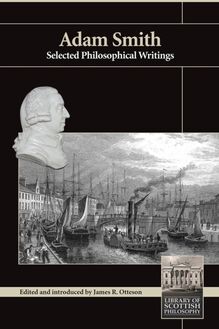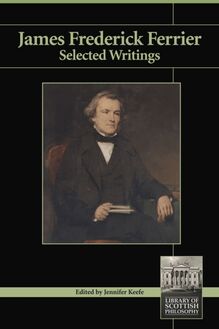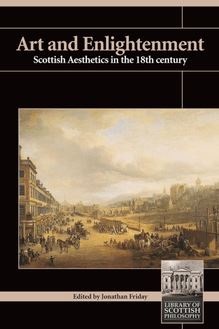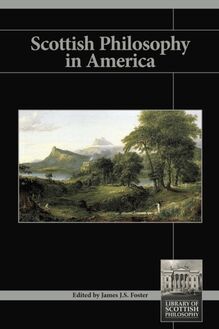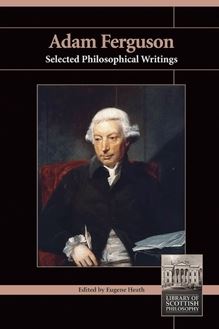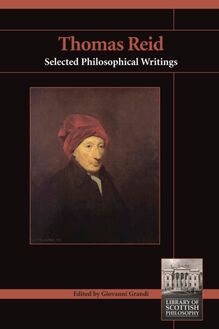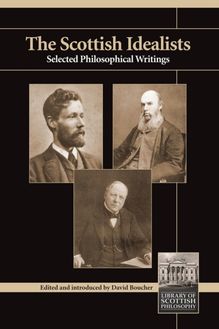James Frederick Ferrier , livre ebook
119
pages
English
Ebooks
2016
Vous pourrez modifier la taille du texte de cet ouvrage
Obtenez un accès à la bibliothèque pour le consulter en ligne En savoir plus
Découvre YouScribe en t'inscrivant gratuitement
Découvre YouScribe en t'inscrivant gratuitement
119
pages
English
Ebooks
2016
Vous pourrez modifier la taille du texte de cet ouvrage
Obtenez un accès à la bibliothèque pour le consulter en ligne En savoir plus
Publié par
Date de parution
16 mars 2016
Nombre de lectures
4
EAN13
9781845403164
Langue
English
Publié par
Date de parution
16 mars 2016
Nombre de lectures
4
EAN13
9781845403164
Langue
English
Title Page
JAMES FREDERICK FERRIER
Selected Writings
Edited and Introduced by Jennifer Keefe
IMPRINT ACADEMIC
Publisher Information
The moral rights of the author have been asserted.
No part of any contribution may be reproduced in any form without permission, except for the quotation of brief passages in criticism and discussion.
Originally published in the UK by Imprint Academic
PO Box 200, Exeter EX5 5YX, UK
Originally published in the USA by Imprint Academic
Philosophy Documentation Center
PO Box 7147, Charlottesville, VA 22906-7147, USA
Digital version converted and published in 2011 by
Andrews UK Limited
www.andrewsuk.com
Full series details:
www.imprint-academic.com/losp
Series Editor’s Note
The principal purpose of volumes in this series is not to provide scholars with accurate editions, but to make the writings of Scottish philosophers accessible to a new generation of modern readers in an attractively produced and competitively priced format. In accordance with this purpose, certain changes have been made to the original texts:
•Spelling and punctuation have been modernized.
•In some cases, the selected passages have been given new titles.
•Some original footnotes and references have not been included.
•Some extracts have been shortened from their original length.
Quotations from Greek have been transliterated, and passages in foreign languages translated, or omitted altogether. Care has been taken to ensure that in no instance do these amendments truncate the argument or alter the meaning intended by the original author. For readers who want to consult the original texts, full bibliographical details are provided for each extract.
The Library of Scottish Philosophy was originally an initiative of the Centre for the Study of Scottish Philosophy at the University of Aberdeen and the first six volumes were commissioned with financial support from the Carnegie Trust for the Universities of Scotland. In 2006 the CSSP became one of three research centers within the Special Collections of Princeton Theological Seminary, and with the Seminary’s financial support more volumes have been published. James Frederick Ferrier: Selected Writings is the twelfth volume in the series and has been prepared for publication by Olivia Lane.
Acknowledgements
The CSSP gratefully acknowledges the financial support of the Carnegie Trust and Princeton Seminary, the enthusiasm and excellent service of the publisher Imprint Academic, and the permission of the University of Aberdeen Special Collections and Libraries to use the engraving of the Faculty of Advocates (1829) as the logo for the series.
Gordon Graham,
Princeton, March 2011
I. Introduction
This volume contains selections from the philosophical writings of James Frederick Ferrier. Ferrier was born on the 16th of June in Edinburgh into a well-connected Edinburgh family; his aunt was the novelist Susan Ferrier and family friends included notable figures such as Thomas De Quincey and John Wilson or ‘Christopher North’ who afterwards became Ferrier’s father-in-law. He started his university education in Edinburgh in 1825, which he later completed at Magdalen College in Oxford, graduating in 1832. Yet, Ferrier did not begin to develop a serious interest in philosophy until after university. From 1838 he published a number of philosophy articles in Blackwood’s Magazine and in 1842 he acquired his first academic chair when he became the Professor of Civil History at the University of Edinburgh. A few years later, in 1845, he moved to St Andrews to become the Professor of Moral Philosophy and he remained there until his death in 1864. His contribution to philosophy was initially well-received yet his failure to acquire two key academic chairs at the University of Edinburgh in the eighteen-fifties [1] coupled with the poor reception of his major work, the Institutes of Metaphysic , contributed towards his total obscurity until George Davie’s reconsideration of his work in the nineteen-sixties. Nevertheless, Ferrier is an interesting figure in the history of Scottish and British philosophy. Not only is he one of the first post-Hegelian British idealists but he develops his system of absolute idealism via a rejection of the Scottish school of common sense and Enlightenment philosophy in general. Ferrier’s intellectual interests include both literature and philosophy. His philosophical writing is quintessentially nineteenth century; poetic descriptions and vivid metaphors as well as a sharp wit, which is rather vicious at times, pervade his discussion of abstract metaphysics. These selections focus on his primary philosophical interests: epistemology and ontology. Ferrier denies the possibility of a science of man and suggests that philosophy should focus on self-consciousness, the defining feature of humanity.
I
He was strongly influenced by his friend and mentor, Sir William Hamilton, who tried to reconcile Reid’s common sense philosophy with Kant’s transcendental idealism. Hamilton was unsuccessful in this task and the increasing influence of German philosophy in Britain coincided with the demise of the common sense school. Ferrier inherits some of his philosophical interests from Hamilton; for instance, both philosophers recognize that the immediate facts of consciousness are the starting-point for philosophy. However, Ferrier completely breaks with the common sense school and provides a system of absolute idealism focusing on epistemology and metaphysics. Indeed, he is the first in a series of Scottish Idealists, including figures such as Edward Caird and D.G. Ritchie. [2] The emergence of British idealism can largely be explained by the influence of Kant and the German idealists. Ferrier does not show much appreciation for the philosophy of Kant; he rarely mentions him and when he does it is to criticize the German philosopher’s commitment to the existence of things-in-themselves. Nevertheless, he both read and respected the philosophy of the German idealists, specifically Fichte, Schelling and Hegel. Yet, Ferrier’s idealism largely depends upon his reaction to British philosophy. He defends the idealism of Berkeley and attacks the enlightenment goal to develop a ‘science of man’, directing much of his rancor towards the Scottish school of common sense. In the late nineteenth century and early twentieth century a leading school of philosophy in Britain was idealism. Hence, Ferrier provides a system of absolute idealism that anticipates the type of philosophy that was to dominate British philosophy in the following decades. Yet, unlike the later British Idealists, he was not part of a group of like-minded and influential thinkers. His philosophy was not well-received by his contemporaries and he was intellectually isolated. Nevertheless, his philosophy bridges the transition from one school of Scottish philosophy to another.
II
Ferrier dismisses the Enlightenment project of trying to develop a ‘science of man’ as a mistaken and impossible undertaking. The basis for this view is rooted in his account of consciousness. According to Ferrier, philosophy should not be modeled on the science of the world because the scientist of humanity, unlike the natural scientist is at once the subject and object of her study. In his view, the characteristic aspect of human beings, the feature that separates humans from all other living things, is consciousness. [3] It follows that if the scientist of humanity wishes to study humanity then she must attend to consciousness, its most peculiar feature. However, consciousness is something that the scientist of humanity employs in all of her endeavours, including her study of humanity. She is therefore presented with a cognitive impasse; she either engages in a substandard study and neglects consciousness, the defining feature of her object, or she invests her object with consciousness and diminishes the subject of the study, rendering the science impossible. Ferrier believes that Enlightenment philosophers tend towards the former option and objectify the self, thereby depriving it of consciousness. He argues that as a direct consequence of this only a vapid picture of a human can be provided by a science of man, merely “a wretched association machine”. [4] Given the special status of human beings as conscious creatures Ferrier contends that philosophy should not be a science but rather a systematic form of consciousness.
III
There are similarities between Ferrier’s philosophy and the Scottish tradition of common sense. Yet, this is defined purely in terms of a shared agenda because he rejects the methods and the focus of common sense philosophy in favour of an idealist system of metaphysics. Although Ferrier cannot be considered as a common sense philosopher, he works within the parameters of the Scottish philosophical tradition; a tradition in which common sense played a large part. Ferrier accepts, along with Reid, that the theory of ideas is a mistaken project. He acknowledges that there are no intermediate entities - ideas - between the knower and the object of her knowledge. The problem with common sense philosophy, he believes, is that Reid hasn’t gone far enough in vanquishing imaginary philosophical entities and displacing representationism. In Ferrier’s view, Reid’s realism separates an act of cognition into a subject and an object, namely, the perceiver and the perceived. In ‘Reid and the Philosophy of Common Sense’ he refers to such accounts of perception as the ‘psychological doctrine’ and asserts that any such analysis of perception is not only false but retains the very basis for the representationism that Reid sought to overcome. The separatio
